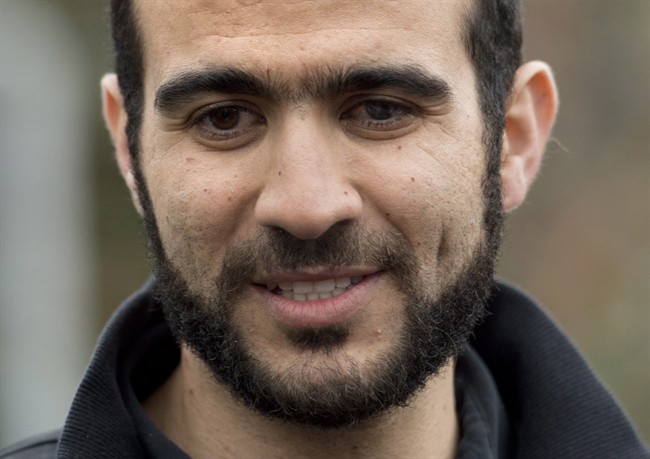TORONTO – An American court decision in the case of an alleged al-Qaida recruiter Friday has cast further doubt on the war crimes convictions of Canada’s Omar Khadr.

In its split ruling, the appeals court set aside the military commission conviction of Ali Hamza al-Bahlul, a Guantanamo Bay detainee who did media relations for terrorist mastermind Osama bin Laden.
In essence, the U.S. Court of Appeals for the District of Columbia Circuit ruled that the conspiracy case against al-Bahlul was legally flawed because conspiracy is not a war crime – similar to arguments Khadr has made. The commission only had jurisdiction to try internationally recognized war crimes, the court said.
READ MORE: Widow, ex-soldier move for final judgment on $134M suit against Omar Khadr
Khadr’s Pentagon-appointed lawyer was not immediately available to comment, but one of his Canadian lawyers said the decision undermines Khadr’s conviction and his appeal should now be allowed.
“By implication, (the ruling) pretty much seals the deal with respect to Omar’s appeal,” Nate Whitling said from Edmonton.
“This case clearly confirms that all five of Khadr’s convictions are invalid and must inevitably be overturned.”
The Toronto-born Khadr was convicted of five war crimes in October 2010 after he pleaded guilty before a widely condemned military commission to offences he was accused of committing as a 15-year-old in Afghanistan in 2002.
He is appealing the conviction on the grounds that the commission had no jurisdiction to try him because the offences with which he was charged were not war crimes at the time. However, the commission appeals court has refused to hear the case pending the outcome of the al-Bahlul challenge.
READ MORE: U.S. soldier wounded during firefight in Afghanistan rips Omar Khadr’s release
Whitling said the Court of Military Commission Review should now get on with hearing Khadr’s challenge given that the al-Bahul case has been decided.
“That abeyance has now expired,” Whitling said. “They should make a decision on the merits.”
Khadr, now 28, who returned to Canada in 2012 to serve out his eight-year sentence, was released on bail last month into the custody of Edmonton lawyer Dennis Edney pending the outcome of his American appeal.
The Canadian government, which brands him a dangerous terrorist, is still fighting to put him back behind bars and appealing the bail decision.
The U.S. government has conceded that Khadr’s offences were not international war crimes, but has maintained he violated domestic common law dating to the Civil War.
READ MORE: Supreme Court rejects federal bid to consider Omar Khadr adult offender
While the al-Bahlul ruling does not speak directly to Khadr’s other convictions such as murder and attempted murder, Whitling said the same legal logic applies – the military commission had no jurisdiction to try him.
U.S. courts had previously rejected another of the offences for which Khadr was convicted in a case against one of bin Laden’s drivers: material support for terrorism.
The system of military commissions was created by the administration of former president George W. Bush after the 9/11 terrorist attacks on the U.S.
President Barack Obama’s administration had argued Congress acted within its authority in making conspiracy a crime that could be tried by military commission.
The American government could still try to appeal the al-Bahlul decision to the Supreme Court.



Comments